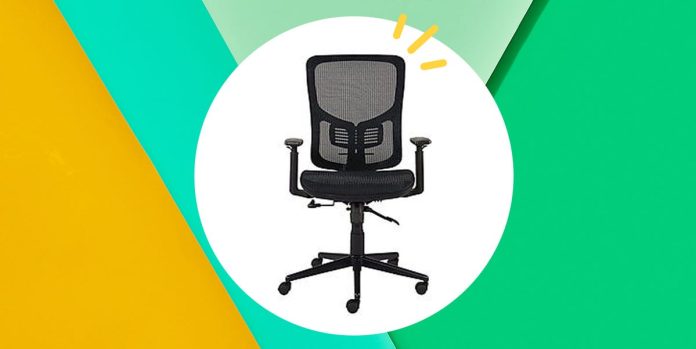Christine Giordano
Besides your bed, your office chair is one of the places where you spend the most amount of time. So, like the importance of finding the perfectly firm mattress or most pillow to sleep on, picking out the best, most supportive office chair is essential to prevent (or, even treat) back and neck pain, discomfort, or muscular fatigue.
If you can think back to seventh grade science class, you know your spine is made up of vertebrae. In between those vertebrae are discs, which help cushion the bones in your spine—sort of like shock absorbers for your body. Like you, your discs aren’t really a fan of long periods of time spent sitting at your desk.
1

Aeron Ergonomic Chair
Herman Miller
Read More
2

3

Freedom Office Desk Chair
Humanscale
Read More
4

5

VIVO Ergonomic Kneeling Chair
DRAGONN
Read More
“When you’re in a seated position, that puts the highest amount of pressure on the discs in the lumbar spine,” explains Dr. Adam Schell, MD, a spine surgeon. “When you’re standing, the pressure on the discs is pretty low.” That’s why in addition to buying the best office chair, Schell recommends making sure you get up and walk around regularly, or even consider using a standing desk.
How you’re sitting in the chair also makes a difference. Your posture (whether it’s slumped or too rigid) and the position of your knees when you’re sitting, especially if they’re overextended, can change the position of your back, creating a situation that may lead to pain, says Dr. Emily Wang, MD, an internist at the Arnold-Warfield Pain Center.
With more people working from home than usual in the past several years, chiropractor Steve Hannegan, D.C. says he’s seen a lot more cases of work-related, chair-related, or sitting-related back pain caused by people not sitting in supportive positions at their virtual offices. So as much as you may want to, it’s probably not a good idea to work from your couch or bed all day.
So, if trying to find the best office chair for preventing back pain sounds like too much of, well, a pain…relax, take a seat, and stay a while. See below for the 10 best expert-recommended office chairs for back pain.
Advertisement – Continue Reading Below
- Made from recycled materials
- 12-year warranty
If office chairs were characters in Gossip Girl, the Herman Miller Aeron is Serena van der Woodson. It’s the It chair everyone wants to have around (their desk).
While some might think of it as a mere status symbol, a large amount of thought went into the Aeron’s design. First introduced in 1994 and over eight million sold since (including at least one to Mark Zuckerberg) according to their site, the Aeron features adjustable arms, height, seat tilt, and lumbar support. FYI, it’s nearly $2,000, but def worth the splurge if you plan on working from home for a while.
Specs:
Weight – 41 pounds, Supports up to 300 pounds
Dimensions – 27 x 27 x 41 inches
No assembly required
Color options – Black, White, Gray
- Able to support more weight than other models
- Variety of color options
- Seat is flexible and cushioned, but not adjustable
When looking for an office chair, Schell says it’s important to try out different models in the store and then shop online, and to make sure when you’re trying out a chair that you think about what you will be doing in it.
For example, most people’s instinct when they sit in a chair is to lean back, but really, you’ll be spending most of your time reading emails and leaning forward at your desk. Make sure that you think about both when you’re at the store.
“It’s almost like Goldilocks and the Three Bears,” says Schell. “You have to try all the porridge until you find what’s just right. Everybody’s body is a little bit different, so trying out the different styles of chairs is how you find the one that you like.”
Like the porridge that was in between too hot and too cold, this chair from Steelcase Series includes many of the same features, like adjustable arms, a flexible seat, and a supportive mesh back, as higher-end chairs without the hefty price tag.
Specs:
Weight – 36 pounds, Supports up to 400 pounds
Dimensions – 22 x 27 x 42.5 inches
Assembly required
Color options – Frame: Black, Seat: 19 different options
- Manufacturing process meets Living Product sustainability certifications
- Design is slightly bulkier than other options
A good office chair should work with you, or as Wang says, “The office chair should fit the person, not the other way around.”
The backrest of the Humanscale Freedom chair is said to move with you—not against you, with a reclining feature that moves with you when you lean back without the use a lever. The headrest helps ensure your neck and head are supported at all angles, and the armrests are attached to the back of the chair instead of the base, so they also lie back when you do.
Specs:
Weight – 40 pounds, Supports up to 300 pounds
Dimensions – 26 x 26 x 43 inches
Assembly required
Color options – 10 options
- Customizable seat and frame color
- 7-year warranty
- Current shipping estimates are over a month out from order date
- Only available for purchase directly from Branch’s site
This sleek chair from Branch allows you to adjust its height and armrests, and features lumbar support and a seat tilt, something Hannegan says is important for making sure you’re resting on the bones of your butt and the back of your thighs (aka where you should be sitting) instead of rolling back fully onto your tailbone.
Specs:
Weight – 37 pounds, Supports up to 300 pounds
Dimensions – 38-42 x 25 x 24 inches
Assembly required
Color options – Frame: Black, White, Seat: Black, Gray, Blue
- Lightweight and easy to move around
- An adjustment period is recommended, so not ideal for using all day immediately
Kneeling chairs help to better mimic the curvature of your spine when you’re standing more than standard office chairs, according to a study from researchers at Teesside University, as they put less pressure on your discs.
It distributes weight between your legs and butt evenly, helping to keep your spine aligned. The seat is adjustable up to 10 inches in height, too.
Specs:
Weight – 19 pounds, Supports up to 250 pounds
Dimensions – 24.02 x 17.99 x 22.01 inches
No assembly required
Color options – Black, Gray, White
- 90% recyclable
- 12-year warranty
- Unframed back design might not be comfortable or atheistically pleasing for some
If you’re looking for craftsmanship Herman Miller is known for without dropping $1000+ on the Aeron, the Sayl is a good compromise. Inspired by the design of suspension bridges, the Sayl’s back is made from elastomer strands that are designed to move with you and adjust support as needed.
The height, armrests, seat tilt, and seat depth are also all adjustable for a custom chair feel.
Specs:
Weight – 54 pounds, Supports up to 350 pounds
Dimensions – 40.75 x 24.5 x 26 inches
No assembly required
Color options – Frame: Black, White, Gray combos, Seat: Numerous options
- Core engagement is said to help keep you more energized
- No arm support
- People in the office may know you as the person who sits on a yoga ball
While you might be skeptical about its comfort, sitting on a yoga ball instead of a traditional office chair is a swap that Schell says he knows several patients have made.
In addition to engaging your core during the day, using a balance ball also helps with spine alignment, so go on and get your zen on.
Specs:
Weight – 13 pounds, Supports up to 300 pounds
Dimensions – 22 x 22 x 31 inches
Minor assembly required
Color options – Frame: Black, Ball: Seven options
A good office chair doesn’t have to break the bank. This less than $200 find features an adjustable seat, and you can toy around with the arm height to make it a perfect fit for you.
Hannegan and his team personally use these in their office, he says. “You don’t necessarily need a really fancy high-end chair; a lot of it is how you sit in the chair,” he explains. “You can have a really high-end chair and still have bad posture and still hurt your back.” So make sure you sit up tight (more on that later!).
Specs:
Weight – 47 pounds, Supports up to 275 pounds
Dimensions – 41.1-44.9 x 28.7 x 27.6 inches
Assembly required
Color options – Black
- Lighter than other models
- Able to support more weight than other models
- No armrests
- Not everyone’s style
A 2012 study from researchers at Cardiff University found that saddle chairs—chairs that have a raised section in the middle to mimic a saddle—are especially beneficial when it comes to preventing back pain. That being said, sitting in one takes a little bit of getting used to and might not be everyone’s first choice when it comes to desk mates.
Specs:
Weight – 23 pounds, Supports up to 350 pounds
Dimensions – 23.5 x 23.5 x 10 inches
Assembly required
Color options – Frame: black, white, gray,
- Available in vegan leather
- Not able to support as much weight as other models
With an origin story that includes both Kickstarter and Shark Tank, the BackStrong chair is making a name for itself in the office chair world. Its patented Sit in Motion technology is said to almost cradle your pelvis and your lower back, moving when you move to always keep you comfortable.
As a bonus, the arms can be put in a full 90-degree upright position, so you can scoot closer to your desk if you need to, which helps keep you from hunching over when you need to take a close look at your computer screen.
Keeping your screen at eye level, your head and neck in line with your torso, and elbows close to the body are all things you should keep in mind when sitting for extended periods of time, explains Wang.
Specs:
Weight – 48 pounds, Supports up to 275 pounds
Dimensions – 22 ¼–30 × 26 ¼ × 41–44 inches
Assembly required
Color options – Black, Red, Beige
Absolutely, yes. Pain throughout the day while you’re sitting, pain when you go from a sitting to a standing position, and sciatica (pain down your leg) are all signs that your office chair might not be doing the best job supporting your back and posture.
“We’re not designed to sit all day,” says Hannegan. “So, a chair that isn’t properly supporting the back and helping our muscles from fatiguing will lead to the breakdown of the whole system and cause pain.”
It’s also important to realize those times when you might be dealing with an issue that goes beyond a bad office chair. If the pain is persisting after you’re no longer sitting, if it’s affecting your sleep, or it’s restricting your exercise or normal routine, you should consider making an appointment with your doctor, says Hannegan.
Your back isn’t like anyone else’s back, so one of the most important things to look for when it comes to an office chair is how much you’re able to customize it to your specific needs. This means you’ll want to see the word “adjustable” as much as possible—adjustable seat, adjustable armrests, and definitely adjustable height.
One term that you are guaranteed to come across when shopping for an office chair is “lumbar support,” which means that a part of the chair has been designed to support your lower back.
However, experts say there isn’t a lot of scientific data that supports the benefits of the feature. Everyone’s back is different, so it’s hard for companies to create something that works for everyone, Schell says. “The best lumbar support you can really have is a strong core.”
More than banking on features like lumbar support to prevent pain, Wang says you should consider a few work-style changes as well. “It is more important to limit time on task in one position. Take regular breaks from sitting, and stand more often,” she says.
The first thing you want to do is scootch your booch all the way to the back of the chair. Your hips should be touching the back of the chair, says Hannegan. And, your pelvis should be rotated slightly forward.
When it comes to the height of the chair, make sure your feet can comfortably reach the ground, but that your knees are slightly higher than your hips and at about 90 degrees.
You want your elbows at about 90 degrees also, so make sure to adjust the height of the armrests so your joints are comfortable and your shoulders are relaxed. And then, you’re ready to get to work!
This content is created and maintained by a third party, and imported onto this page to help users provide their email addresses. You may be able to find more information about this and similar content at piano.io
Advertisement – Continue Reading Below



